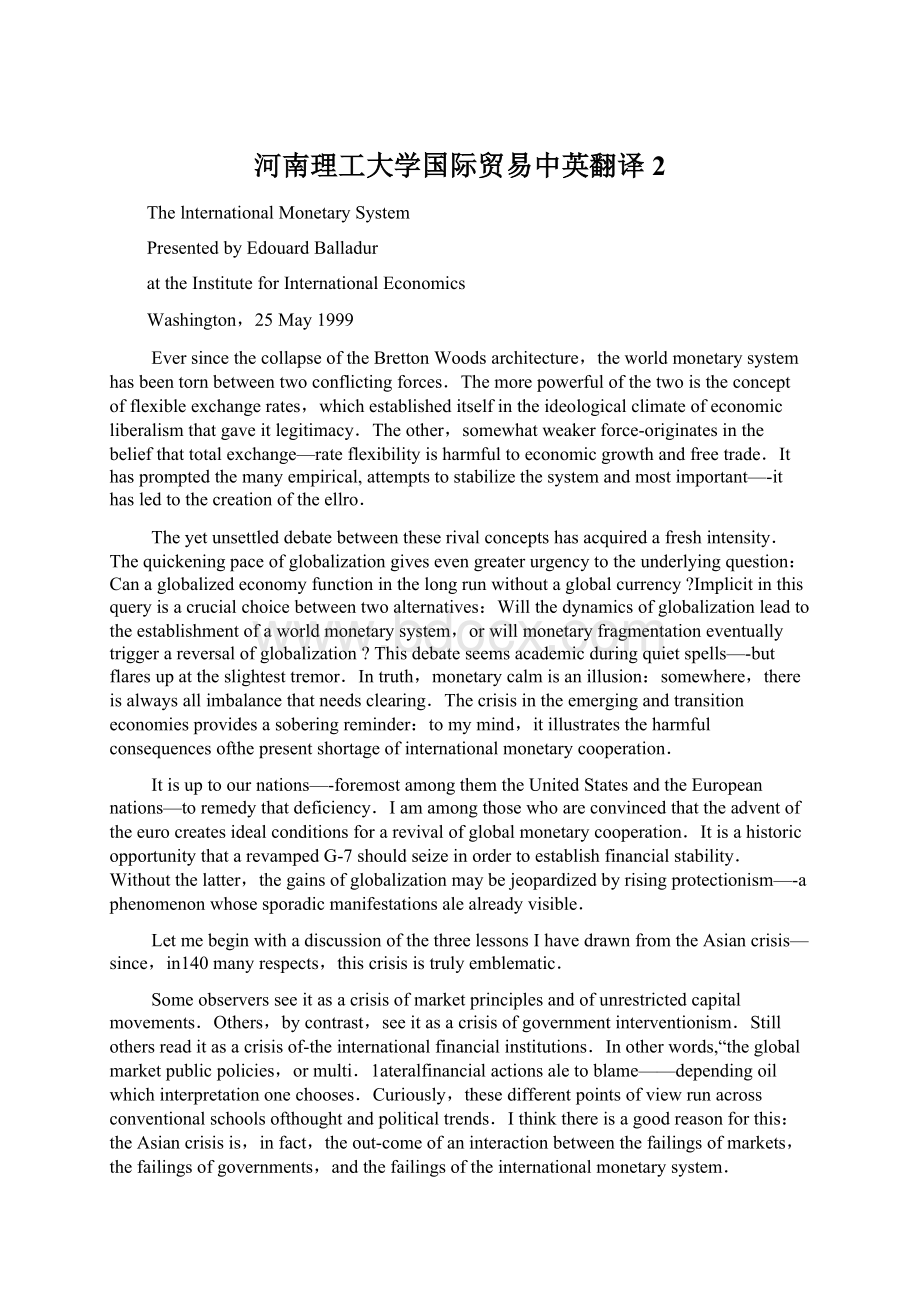河南理工大学国际贸易中英翻译2.docx
《河南理工大学国际贸易中英翻译2.docx》由会员分享,可在线阅读,更多相关《河南理工大学国际贸易中英翻译2.docx(11页珍藏版)》请在冰豆网上搜索。

河南理工大学国际贸易中英翻译2
ThelnternationalMonetarySystem
PresentedbyEdouardBalladur
attheInstituteforInternationalEconomics
Washington,25May1999
EversincethecollapseoftheBrettonWoodsarchitecture,theworldmonetarysystemhasbeentornbetweentwoconflictingforces.Themorepowerfulofthetwoistheconceptofflexibleexchangerates,whichestablisheditselfintheideologicalclimateofeconomicliberalismthatgaveitlegitimacy.Theother,somewhatweakerforce-originatesinthebeliefthattotalexchange—rateflexibilityisharmfultoeconomicgrowthandfreetrade.Ithaspromptedthemanyempirical,attemptstostabilizethesystemandmostimportant—-ithasledtothecreationoftheellro.
Theyetunsettleddebatebetweentheserivalconceptshasacquiredafreshintensity.Thequickeningpaceofglobalizationgivesevengreaterurgencytotheunderlyingquestion:
Canaglobalizedeconomyfunctioninthelongrunwithoutaglobalcurrency?
Implicitinthisqueryisacrucialchoicebetweentwoalternatives:
Willthedynamicsofglobalizationleadtotheestablishmentofaworldmonetarysystem,orwillmonetaryfragmentationeventuallytriggerareversalofglobalization?
Thisdebateseemsacademicduringquietspells—-butflaresupattheslightesttremor.Intruth,monetarycalmisanillusion:
somewhere,thereisalwaysallimbalancethatneedsclearing.Thecrisisintheemergingandtransitioneconomiesprovidesasoberingreminder:
tomymind,itillustratestheharmfulconsequencesofthepresentshortageofinternationalmonetarycooperation.
Itisuptoournations—-foremostamongthemtheUnitedStatesandtheEuropeannations—toremedythatdeficiency.Iamamongthosewhoareconvincedthattheadventoftheeurocreatesidealconditionsforarevivalofglobalmonetarycooperation.ItisahistoricopportunitythatarevampedG-7shouldseizeinordertoestablishfinancialstability.Withoutthelatter,thegainsofglobalizationmaybejeopardizedbyrisingprotectionism—-aphenomenonwhosesporadicmanifestationsalealreadyvisible.
LetmebeginwithadiscussionofthethreelessonsIhavedrawnfromtheAsiancrisis—since,in140manyrespects,thiscrisisistrulyemblematic.
Someobserversseeitasacrisisofmarketprinciplesandofunrestrictedcapitalmovements.Others,bycontrast,seeitasacrisisofgovernmentinterventionism.Stillothersreaditasacrisisof-theinternationalfinancialinstitutions.Inotherwords,“theglobalmarketpublicpolicies,ormulti.1ateralfinancialactionsaletoblame——dependingoilwhichinterpretationonechooses.Curiously,thesedifferentpointsofviewrunacrossconventionalschoolsofthoughtandpoliticaltrends.Ithinkthereisagoodreasonforthis:
theAsiancrisisis,infact,theout-comeofaninteractionbetweenthefailingsofmarkets,thefailingsofgovernments,andthefailingsoftheinternationalmonetarysystem.
TheinternationalcapitalmarkethasanunquestionableresponsibilityintheAsiancrisis.Internationalinvestors—chieflythecommercialbanks—a-greedtoinvestinAsiawithoutmeasuringtherisksincurred.Theyfueledspeculativebubblesinthee-mergingAsianeconomiesevenastheregionwassufferingalossofcompetitivenessandacreditexplosion.Whenthecrisiserupted,theinvestorswiththecommercialbanksonceagaininthelead—abruptlypulledout.Thelocalexchangeratesandrealeconomiesoverreacted,costingtheAsiancountriesanestimatedaverage7—8pointsofGDP.thescaleofthisoverreactionwascertainlyunwarranted,sinceitwaspartlycorrectedafewmonthslater,Thisisafarcryfromtherationalcapitalmovements---withtheirstabilizingvirtues—describedinpoliticaleconomytextbooks.Themarketsareintrinsicallyimperfect,asistheirinformation.
Governments,too,bearamajorresponsibilityintheAsiancrisis.Internationalinvestorsweredeludedbytheeconomicdistortionsthat、theAsiangovernmentshadintroduced(orhadallowtodevelop)intheworkingsoflocalmarkets.Suchdistortionsincludeunsuitableexchangeratesdefendedbythemonetaryauthorities,implicitguaranteestoinvestorsintheabsenceoffinancial——sectorregulation,andtaxbreaksorotherbenefitsreservedforcertainbusinesssectors.Theresultwasaninefficientallocationofresources,ofwhichSouthKorea—despiteitsunquestionableprofessionalisminsomeareas—probablyprovidesthebestillustration.Again,thisbearslittleresemblancetotheenlightenedstatethattheAsianmodel'sdefendersofferedusasabenchmarkbeforethecrisis.Governmentsareneitheromniscientnoralwaysbenign.Withexcessiveinterventionism,theyprovetobepoorinvestorsinthelongrun,occasionallycorrupt,andoftencaptivetopressuregroups.
Multilateralinstitutionsalsomustshouldersomeoftheblameforthecrisiswehavejustexperienced.Theirinterventionshavenotalwaysbeenappropriateforpreventingtherecentcrisesorindeedforsolving.them.Theymayhaveencouragedgovernmentsandlocalbanksaswellasinternationalinvestorst0takeexcessiverisksintheemergingcountries.Theapplicationofpredeterminedsolutionsmayalsohavehelpedaggravatethecrisesunderway.Mostimportant,however,theinternationalcommunityhastendedtointervenebelatedlybecauseofthedeclineoftheG-7andtheproblemsthiscreatedforinter-nationalmonetarycooperation.Theefficiencyofthemultilateralfinancialinstitutionswasseverelyunderminedasaresult.
Thecombinationofthesethreefactorsseemsaplausibleexplanationfortheescalatingintensityofthecrisesandtheever-greaterresourcesthattheinternationalcommunityhashadtodeploytodealwiththem.Inmyview,however,thedeclineoftheG-7andofmonetarycooperationbearsaspecialresponsibilityinthisdevelopment.Thedeclinehassubstantiallyweakenedthescopeofpreventiveactionbythemultilateralfinancialinstitutionsinresponsetogovernments’economicpoliciesandtounstableinvestorbehavior.Countrieswhosefinancialsystemshadnotbeenadjustedwereallowedtoliftallcontrolsoncapitalmovementswiththerestoftheworld,andinsomecasestheywereactuallyencouragedtodoso.
Whatistobedoneintheseconditions?
Wemightbetemptedtotaketheeasywayout-namely,toletthepresentlow—cooperationsituationprevail.Theargumentwouldbethattheworld'srisingmonetaryandfinancialinstabilityisduetofixedexchangeratesandthesupporttheyhavereceivedfromtheinternationalcommunity,notablytheInternationalMonetaryFund.ThecorollaryofthispositionisthatstrictcurbsshouldbeplacedonIMFinterventions.Inauniverseinwhichallagentswereperfectlyinformed,wemightassumethatthisrecipewouldensureinternationalmonetaryandfinancialstability—providedthateconomicpoliciesconverged.Butweknowthatthisisnotthecase.Inpractice,policyconvergence—whetherinthemonetaryorthefiscalsphere——hasnotprovedtobeasufficientguaranteeofmonetarystability.
Thealternativesolutionwouldbetostrengtheninternationalmonetarycooperation,andthefocusshouldbeonexchangerates.Notthatexchangeratesshouldbemanipulated—quitethecontrary.However,theydoexhibitthreecharacteristicsthatmakethemirreplaceableastoolsofinternationalmonetarycooperation.First,theyare,bynature,variablesofcommoninterest.Second,asrelativepricesofcurrencies,theyprovidereliableconfidenceindicatorsfortheeconomicpoliciescarriedoutinthedifferentcurrencyzones.Third.exchangeratesarevaluablesignalsofeconomicimbalances.
ThisleadsUStorecommendareformofthesystemaimedatprovidinggreaterstability—-butwithoutintroducinga“fixedfactor'’thatcouldcompromisethegrowthofunsynchronizedeconomicregions.Severalapproachesarcpossiblehere.Theyallhingeonthenotionofacooperativeeffortfocusedonthedollar-eurorink,whichformsthebasisoftheinternationalmonetarysystem.ThisimpliesanintensivedialoguebetweenUSandEuropeanauthorities.
Thefirstpurposeofthecooperationshouldbetoaddressthefollowingquestion:
Whatisthedesirablefluctuationbandforthedollaragainsttheeuro.inviewofthegoalsstatedearlier?
Ifthisquestionisleftunasked,whichisthecasetoday,then0rareisastrongriskthatthesystemwillcontinuetodrift——sparkingfinancialcrisessuchasthosewehaveseeninrecentyears.Theformsuchcooperationwouldtakecanbemoreorlesscoercive.
Themostambitiousformwouldbetoadopt“targetzones.”asFredBergstenadvocates.Theagreementwouldspecifythefluctuationbandsaroundcentralratesfortheeuro,‘thedollar,andtheyen,whichwouldberegularlyadjustedtoreflectdifferentialsininflationandineconomicfundamentals.Thecentralrateswouldbechosensoastoensuretheeconomies’internalandexternalbalance.Thebandshouldbewideenough(10—15percent)toabsorbtheexchange-ratevariationsduetoshort-termeconomicfluctuations.Itwouldbemadepublicinordertoconfinecentral-bankinterventionstosituationsinvolvingsevereimbalances.Thecentralbankswouldbeobligedtointerveneatthemargins.
Alessambitiousvariantoftargetzoneswouldbetoadopttheprincipleofcompulsoryactionwhentheexchangeratesapproachthefluctuationlimits,butwithoutmakingpublicthecentralratesandthefluctuationbands.ThisisthesolutionthatmostcloselyresemblestheLouvreAccordsof1987.Inpractice,itismoreflexiblethanthefirstoption,asitleavesthemonetaryauthoritiessomeleewayfordecidingwhenandhowtoact,whilekeepingtheircredibilityintactsincetheywouldbemakingnopubliccommitments.
Theestablishmentoftargetzonesseemsdesirabletome,astheyaretheonlycredibleframeworkfororganizingcurrencyfluctuations.Theproblemwithtargetzones,however,isthattheyhavenotwona